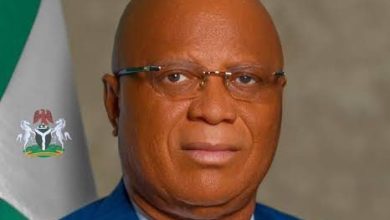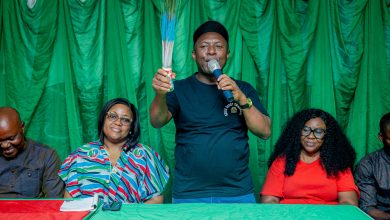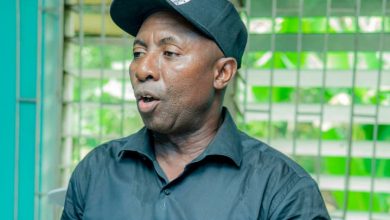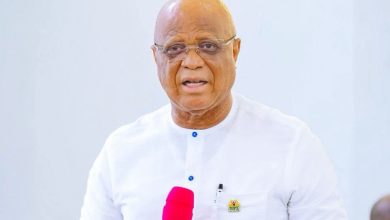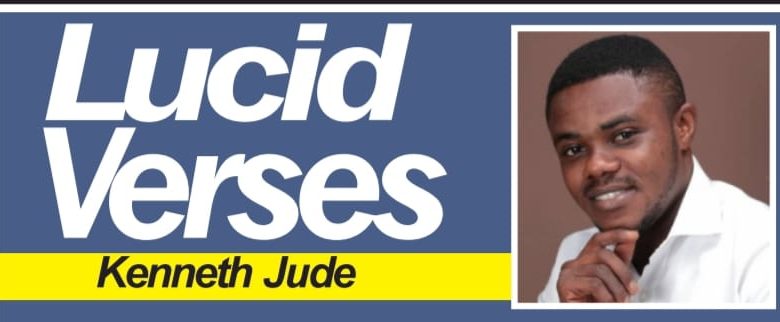
The man, Goodluck Ebele Jonathan, has always lived his “first” name. His political odyssey has been steeped in grace and good fortune. He has seen it all – first as deputy governor, then governor, then vice president, and, of course, president!
From a shoeless poor school chap in the rustic village of Otuoke community in Bayelsa State, Dr Goodluck Jonathan has today become a national and global figure, a treasure of sorts admired for his peaceful disposition.
Humane, urbane and unassumingly soft-spoken, the former President of Nigeria has always been at the forefront of national discourse since losing office to late President Muhammadu Buhari in 2015. After conceding defeat and paving the way for a peaceful transfer of power from one democratically elected President to another, Jonathan has since become the most sought-after bride in the Nigerian political milieu.
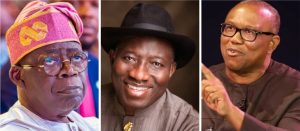
So, in 2019, some people made a case for him to jump into the fray and vie for the number one seat in the country. All over the news – both the online and traditional media – fell over each other to air or report stories as the case may be relating to Goodluck Jonathan contesting the election. While all that was on, nothing concrete was heard from the man. Mum was the gesture from the Zoology graduate. He left many guessing and wondering if he would throw his hat in the ring. Many waited with bated breath, all to no avail. The Peoples Democratic Party (PDP) did their primaries, Jonathan bought no form; neither did he contest in the All Progressives Congress (APC) or any other party.
With that over, the talk of Jonathan contesting for the Presidency in 2019 crawled out of the front pages of major newspapers. The election date was set. The candidates braced up for the race, but our dear Jonathan Ebele was conspicuously not found.
In the last general elections in 2023, with rumour once again raging that Dr Goodluck Jonathan planned to contest, one political group went to the extent of reportedly purchasing a presidential nomination form for him. The plan, according to reports, was for him to fly on the platform of the APC. But like the previous rumour, nothing was heard as the APC primary election came and went without a trace of Jonathan.
Read Also: PDP’s Needless Meeting With INEC
Again today, as all eyes are set on the next cycle of elections in 2027, the political class, especially those from the North, are pushing and urging Goodluck Jonathan to contest. Will he yield to this call? The indicators are seemingly not bright. The man himself, as always, has not spoken. So, where and who is promoting this again?
Well, it is believed that the agitation for Jonathan to return is chiefly promoted by the northern political class, who are disillusioned with the leadership of President Bola Ahmed Tinubu. The northerners believe they can push away Tinubu and install Jonathan, who is still constitutionally empowered to preside over the affairs of Nigeria for four years only, without any option to re-contest.
There is no doubt that it is the Southerners’ turn to lead the country. The North knows this based on the rotational principle of sharing the highest office of the land. And so, having fallen out with some of Tinubu’s policies, which are not favourable to them, they want him out of Aso Rock. But to do this, they want someone else from the South who can unseat him and keep to the four years remaining for the region to have the top seat. In settling for Jonathan, they know that he is constitutionally allowed to serve for another four years only as President of Nigeria.
Again, given his humble nature and lack of desperation for power, the North apparently trusts Jonathan, hence the reason they want him, so that when he is done in 2031, they can take over a seat that they see as their Holy Grail, a golden trophy they should hold to their fill and then decide who to share same with and when to get it back.
It is for the reasons above that the northern political elite prefer Jonathan. It is not necessarily because they like him, but given that they have seemingly lost faith in Tinubu, they see the former President who served for about five years (2010-2015), as the man they can trust to “hold the seat” for them till 2031, when power will return to the North.
Will that see the light of day? Opinions are sharply divided on this, as some believe Jonathan has unfinished business in Aso Rock and hence should be allowed to govern for one term to do that which he has stuffed in his kitty for Nigeria. But another school of thought believes that the push for him to contest is misplaced and a calculated effort to tarnish his good political and global image.
They are strongly of the view that Jonathan should not budge or yield to growing calls to contest the 2027 elections. They see it as a booby trap; he should “jump and pass”. But the North is desperate to have Jonathan on the ballot to ensure that he is the one from the South who occupies that seat instead of Tinubu in 2027, given that he is constitutionally barred from seeking a second term.
So, in all this, what is the Jonathan camp saying? The man himself has neither spoken on this, nor has his body language given the slightest inkling that he will listen to the clamour for him to throw his cherished and hallowed political hat in the ring. But then, there is still next year before 2027. So, is it possible that the man may eventually accept to contest? Will he win? How will he be rated now, having conceded power in an unprecedented manner in 2015 when he became the first Nigerian elected President to lose a reelection bid? How about his numerous global recognitions as an icon of peace and a democrat in every sense of the word? Won’t contesting have negative effects on his image? What if he contests and loses? Well, he can draw muscle from President John Dramani Mahama of Ghana, who lost his reelection bid in 2016 but returned in 2024 and won. Aren’t we admonished not to say ‘never’ until it’s over? Let’s wait.
Other southerners are bracing up to wrest power from Tinubu in 2027. Prominent among them is Mr Peter Obi, who is pledging to serve for only one term of four years. There is Chibuike Amaechi, Governor Abiodun Makinde of Oyo State, and others. At every forum, Obi has maintained this stance. For him, any serious leader can do a lot in four years. But to others who do not believe in his pledge, four years is way too small to do anything meaningful. Moreover, given the propensity of politicians to double-speak, not a few political watchers are of the view that Obi will recant his position if he wins. In fact, some have argued that even if he does not want to, his acolytes, supporters and hangers-on alike will propel him to. But speaking, the tiny-voiced Obi said, “I still find it baffling that my decision to do a term of four years, if given the mandate to rule this country, is generating so much agitation. By this feeling, we are doubting the fact that a sincere leader can achieve much in 48 months. What drives me is not personal ambition, but a deep commitment to seeing Nigeria work. And if the sacrifice required of me is four years of sincere, accountable leadership, so be it,” he stated.
Will Nigerians, especially the northerners, buy into Mr Peter Obi’s one-term pledge? Is it a risk they would like to take? It is a tough ask, but the proponent is basking in high confidence. Will he or anyone else other than Jonathan be considered from the South to do battle with President Bola Ahmed Tinubu? The time is ticking. The answer is not far off.
The former Anambra State Governor also stirred the hornet’s nest recently when he said that he would prefer that the Presidency have a single term of five years without any option of renewal.
Obi made the statement when he paid a courtesy call on Bauchi State Governor, Bala Mohammed. Said the former Anambra State Governor: “I’ve said it, and I want to say it again in this Government House that if I have the opportunity, we should stop having a second tenure for President.
“It should be five years straight so that people can come in knowing they have a job to do.
“What people do now is to be President for one year and use the rest of the years thinking about their next tenure. We must stop it; let’s face the real job, do your own and go.”
Obi may be right in saying that presidents spend a better chunk of their first term thinking, plotting and preparing for their second term, but how feasible will his proposal be? Former Deputy Senate President, Ike Ekweremadu, had himself proposed a single term of six years some years back. He was passionate about it, but the matter fizzled out like ice cream left under the scorching sun. To date, nothing has been heard of that bill, except this new five-year single-term proposal by Mr Peter Obi. Will it fly? Is Nigeria ripe for such a reality? Will the thirst for power and quest for longevity allow those who should support this proposal to do the needful?

